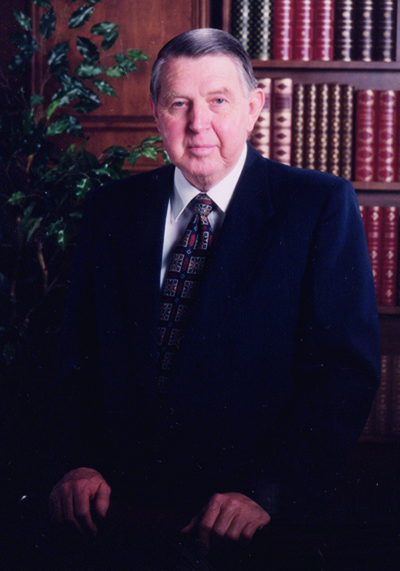Spencer J. Palmer
Spencer J. Palmer was a professor of religion, a scholar of comparative world religions, and as Wikipedia describes, “a chronicler of the development of The Church of Jesus Christ of Latter-day Saints . . . in Asia as well as a major player in these developments.”[1]
Palmer was born on October 4, 1927, in Eden, Arizona, and raised in Thatcher. He grew up in poverty, but his family “worked hard and were always grateful for what little they had.”[2]
He served a mission for the Church of Jesus Christ in California, where his mission president Oscar W. McConkie instilled in him a love of reading. Although he had not read previous to his service as a missionary, afterward he not only read voraciously, he also authored more than a dozen books and numerous articles.
He studied for a time at Eastern Arizona College before he transferred to Brigham Young University and received a bachelor’s degree in fine arts. He was then drafted into the US Army and served in Japan. He applied to become a Latter-day Saint chaplain and was assigned to South Korea. He was drawn to the people and felt deep compassion for their rampant poverty and deplorable living conditions.
- One of Spencer’s happiest memories of his chaplaincy was, again, one of those “unexpected bends in the road.” Lieutenant Palmer had been assigned to a POW camp on Koje Island. Shortly after his arrival, however, it was determined that the camp was no longer needed. Therefore, the soldiers were instructed to dismantle it. The materials were not worth shipping back to the States, so Spencer—along with others—was assigned the responsibility of distributing construction materials among the locals to be used for humanitarian purposes. Making use of these materials, Chaplain Palmer and a handful of American GIs constructed orphanages and schools and even a nursing home for the elderly. In some ways this actually helped Spencer to deal with the distress he felt over the postwar plight of the people of that war-stricken nation.[3]
Palmer had planned to pursue a career in radio broadcasting at the conclusion of his military service, but an experience in September 1954 redirected his path. Elder Harold B. Lee had come to Korea on a Church assignment. After a long discussion, Elder Lee said to Palmer, “I can see that we have a great future in this part of the world. Our problem is that we don’t have people prepared to undertake this work here. I want you to stay close to these Korean people and to the people of Asia. They need us, and they need you.”[4]
Palmer earned a master’s degree in Asian studies from the University of California, Berkeley in 1959 and a PhD in history in 1964. He then joined the faculty of BYU as an assistant professor of Korean studies and Oriental religions. In 1965, he was surprised to be called to preside over the Korean Mission of the Church (1965–1968). Church membership grew by 31 percent during his service. He also helped complete the Korean translation of the Book of Mormon and organized the Korean Mission Genealogical Committee. He also secured “regular spots for the Church on Korean TV and radio,” which improved the image of the Church. During that time, he worked closely with Elder Gordon B. Hinckley who was assigned to oversee the operation of the Church in Asia. Palmer would later serve as a regional representative of the Twelve in Southeast Asia, purchase the site for the Seoul Korea Temple, and serve as president of this temple from 1988 to 1990.
At BYU, Palmer was involved in forming the Asian Studies program. He served as director of the Center for International and Area Studies, the predecessor of the David M. Kennedy Center for International Studies. He taught world religions and opened the minds of his colleagues. He was the coauthor of the textbook used for BYU’s world religions course and the Church Educational System’s Institute of Religion classrooms. His other publications emphasized the faith and cultures of the world, especially Korea’s.
In July 1985, the Korean government honored him with their Order of Cultural Merit and presented him with a citation from the president of South Korea honoring him for his contributions to Korean studies.
- In 1993, Palmer was asked by the Chinese government to serve as a comparative religion professor for ethnic minority groups in Beijing. Midway through the semester, China’s State Committee on Minorities requested that Palmer translate his book, Religions of the World: A Latter-day Saint View into Chinese, for future use at the university. Professor Palmer, with the aid of several of his Chinese colleagues, worked feverishly to complete the project before the end of the semester.[5]
In 1991, Palmer donated his collection of over 5,000 books on Asian and religious topics to BYU’s Harold B. Lee Library; the collection included about 1,500 rare books in Korean.
Palmer passed away on November 27, 2000. He and his wife, Shirley Ann Hadley, were the parents of four children.
